By Liverpool YPAG,
Blog by Jenny Preston, Sammy Ainsworth, Luca and Fathima
In 2016 the Nuffield Council for Bioethics completed a project which examined ethical issues around children and young people’s involvement in clinical research. Throughout the report it endorsed the importance of engaging young people across all aspects 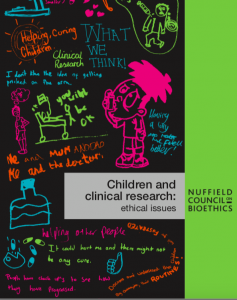 of clinical research including a recommendation that Research Ethics Committees (RECs), who are responsible for making sure research is ethically reviewed and approved, should routinely require researchers to have involved children, young people (CYP) and parents, as appropriate in the design of their studies.
of clinical research including a recommendation that Research Ethics Committees (RECs), who are responsible for making sure research is ethically reviewed and approved, should routinely require researchers to have involved children, young people (CYP) and parents, as appropriate in the design of their studies.  RECs will then be able to draw on the reported opinions of CYP and parents to assess whether the study design is appropriate, whether any risks and burdens have been minimised and justified and whether patient information materials are comprehensive to children, young people and their families.
RECs will then be able to draw on the reported opinions of CYP and parents to assess whether the study design is appropriate, whether any risks and burdens have been minimised and justified and whether patient information materials are comprehensive to children, young people and their families.
One way to facilitate this involvement is through the forum of a Young Person’s Advisory Group, such as GenerationR, and establishing long-term relationships and collaborations across the whole health care system, including collaborations with the Health Research Authority (HRA) who manage RECs in the UK, and are responsible for protecting and promoting the interests of patients and the public in health and social care research.
Young ambassadors influencing the quality of paediatric research
Members of GenerationR YPAGs have worked with the HRA for several years. Two key areas of work young people have influenced is in the production of guidance for researchers in the development of child-appropriate information and through the delivery of training to researchers and REC members about the importance of giving young people a voice in the design of health research.
Previous blogs have focused on the production of guidance for researchers to develop child-appropriate information so the focus here is about the experiences of two young members of GenerationR Liverpool YPAG (Luca and Fathima) who recently delivered a presentation and workshops to an audience of over 200 HRA employees at their annual staff away day.
Taking to the stage – does children’s research really matter?
Luca and Fathima were invited to speak at the HRA staff day with the amazing Dr Bob Philip’s (Senior clinical academic and an Honorary Consultant in Paediatric/Teenage-Young Adult Oncology at Leeds Children’s Hospital) who provocatively raised the topic of whether research on children really mattered, and how children and young people can be real advocates (Ambassadors) for research. His talk was energetic and thought provoking and led nicely on to Luca and Fathima’s talk about children’s rights to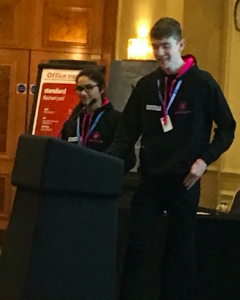 participate in discussions and decisions about their own healthcare and how the forum of a young person’s advisory group has allowed them to do this. Luca quite admiringly stated that hopefully one of his achievements being a member of the YPAG was that he was helping other children and young people being invited to take part in health research be part of the decision-making process, by developing clear information about the risks and burdens of the study so they know exactly what they are agreeing to be part of. This reminded me of a quote from Dr Martin Luther King, who stated
participate in discussions and decisions about their own healthcare and how the forum of a young person’s advisory group has allowed them to do this. Luca quite admiringly stated that hopefully one of his achievements being a member of the YPAG was that he was helping other children and young people being invited to take part in health research be part of the decision-making process, by developing clear information about the risks and burdens of the study so they know exactly what they are agreeing to be part of. This reminded me of a quote from Dr Martin Luther King, who stated
“What children do this day will have an impact on children who have not been born”
Young ambassadors for research like Luca and Fathima are paving the way for other children and young people in the future to have a say and make decisions in all areas of life including their own healthcare.
The presentation was well received and led nicely on to two back to back workshops in the afternoon, entitled “creating a space for young people’s involvement in health research”.
Workshops
The workshops began with a brief overview and background to the establishment of the YPAGs across the UK and the importance of giving children and young people the opportunity to co-design children’s research. The workshop was delivered like a typical YPAG meeting, starting with a warm up activity,’ What does research mean to you?’. Working in small groups they had to express this using only a piece of tin foil and nothing else! A look of both terror and confusion appeared on many faces, soon to be replaced by pure competitiveness! There were some really great results. Our favourites included a research tree with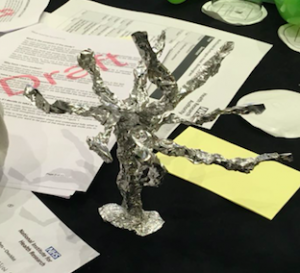 different branches bending and twisting, this showed how research grows and develops in many different and sometimes complex ways. Boats were also a common theme in many different shapes and sizes, carrying patients through stormy times. A personal favourite was the design that depicted a family, showing that research can be part of everyone’s journey and how it can change outcomes for every age.
different branches bending and twisting, this showed how research grows and develops in many different and sometimes complex ways. Boats were also a common theme in many different shapes and sizes, carrying patients through stormy times. A personal favourite was the design that depicted a family, showing that research can be part of everyone’s journey and how it can change outcomes for every age.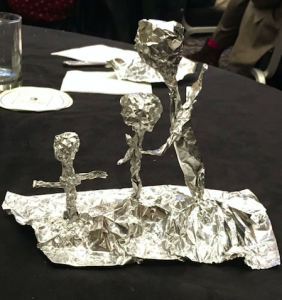
Icebreaker over the real work began with an explanation about the requirement for age appropriate information on clinical trials to be better written in order for CYP to genuinely understand what they are being asked to take part in. People seemed quite shocked at how unfit for purpose some of the patient information sheets actually are. They began to work together, in groups to assess and comment on an example of a real study patient information sheet handed out. Some really great feedback was given and you got a sense that people realised how much this information for young people needs to be changed for true understanding and consent to really be achieved. A good discussion and questions followed which allowed a great opportunity for our young people to share their experiences of the studies they had reviewed.
Added value of young people’s involvement in ethical review
Collaborating with the HRA and being invited to deliver presentations, and workshops provides an excellent opportunity for young people to highlight how their involvement can increase the ethical acceptability of a research study prior to it being submitted for ethical review, which as a consequence may help facilitate the decision-making process for research ethics committees.
Most importantly the HRA have established a Public Involvement in Ethical Review (PIER) programme of work to support an improvement in the level and quality of public involvement in applications to the HRA. The purpose is to achieve greater consistency across RECs in how they address Public Involvement and consider it in their decision making. Recently PIER have 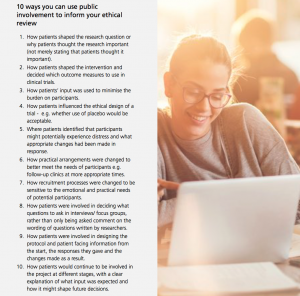 produced 10 ways researchers can use public involvement to inform their ethics applications, claiming that if they followed best practice then there’s a good chance they are on the right track.
produced 10 ways researchers can use public involvement to inform their ethics applications, claiming that if they followed best practice then there’s a good chance they are on the right track.
Future work of PIER includes:
GenerationR and Young Ambassadors will work alongside PIER to help them achieve these aims and continue to promote the rights of young people to have a say in the design of their own healthcare.